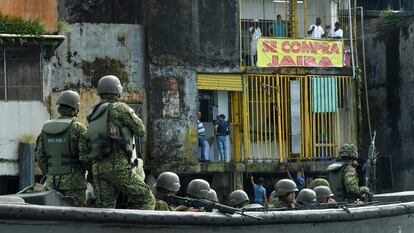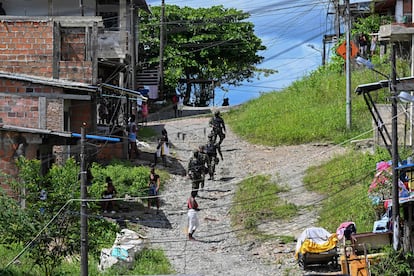Gripped by escalating violence, patience wears thin in Colombia’s largest port city
Buenaventura’s spike in homicides has prompted proposals to militarize the area while the High Commissioner for Peace plans new outreach efforts with criminal gangs

Buenaventura, a major port on Colombia’s Pacific coast, has been designated a “peace laboratory” by President Gustavo Petro’s administration. But local residents say they feel trapped by the cycle of escalating violence. In the last weekend of June, clashes between rival gangs – Los Shottas and Los Espartanos – caused five deaths as they fought for control over the local drug trade. In May, there were 21 reported murders, a little over twice the number in May 2022. In July, a viral video showed around 20 hooded youths wielding machine guns as they vowed to protect the port “with blood and fire” against Mexico’s Jalisco drug cartel. The video had no timestamp and the identities of the armed men remain unknown. Meanwhile, the Colombian government expressed alarm over the situation in the nation’s largest port and offered a few explanations for the violence.
Without mentioning any Mexican cartels, Danilo Rueda said on July 5, “The recent violence is caused by dissident factions in the Shottas and Espartanos who are trying to sabotage peace efforts.” Colombia’s High Commissioner for Peace, Rueda is leading the government’s total peace policy. Last September, Rueda announced a ceasefire between the Shottas and Espartanos, two youth gangs with hundreds of members in Buenaventura. The ceasefire dramatically reduced homicides in the city by the end of 2022, but Rueda says the violence reignited three or four months ago. “These two armed groups wanted to participate in peace efforts, but internal conflicts led to violence. However, the vast majority is firmly committed to this peace initiative,” said Rueda.
EL PAÍS traveled to Buenaventura in late 2022, when residents briefly found relief from the pervasive violence and no longer feared for their lives on the streets at night. Curfews have now been reinstated, compelling people to remain indoors after six in the evening. They are trapped in their homes by invisible barriers, fearful of being mistaken for an enemy gang member if they venture outside. They are afraid that a single misstep could lead to a chance encounter with a stray bullet.
“I am very much confined to my home because I live in one of the most violent neighborhoods,” said a local human rights activist, who says it feels like the early days of the pandemic. “Public transportation runs on an irregular schedule. You can hear frequent gunshots and it feels like the High Commissioner is losing control of the situation.”

Governor Clara Luz Roldán (Valle de Cauca department) asked President Petro to militarize the entire city and tweeted, “Buenaventura needs the army to occupy the whole area, protect the community, and STAY here.” This doesn’t sit well with Buenaventura Mayor Víctor Hugo Vidal or the central government. “We believe that militarization has a very complex effect on people’s lives,” Vidal said in an interview with RCN Radio. He prefers less radical approaches like fortifying local security forces. Defense Minister Iván Velásquez also rejected militarization, but said he wants to expand the military and police presence in the port. Velásquez also announced a special security council meeting in Buenaventura on June 6 and 7 to address the situation.
“Sure, there are people in Buenaventura who would like the city to be militarized, but I don’t think we fully realize what that would imply,” says the human rights activist we spoke to. “I still remember when all those troops came here during the Álvaro Uribe administration. While that reduced the violence to some extent, they also committed many human rights violations.” She wants Commissioner Rueda to reactivate and accelerate negotiations with the Shottas and Espartanos that have been on hold since last year while the government tries to pass a law enabling these groups to disarm in a special judicial process. Rueda’s office issued a statement saying that they hope to resume “socio-juridical” dialogue in the next two weeks to better understand the expectations and circumstances of these armed groups. “We ask the citizens of Buenaventura to keep their hopes up,” said a statement from the High Commissioner posted on Twitter.
Hope is in short supply in Buenaventura, but not completely lacking. Some leaders of these two rival gangs want to actively engage in peace initiatives. The Shottas conveyed their commitment to fostering urban peace in Buenaventura by posting a statement on Facebook expressing their desire to establish a formal dialogue table with a solid legal foundation, while acknowledging the challenges and strongly condemning the recent surge in violence.
Just six months ago, Shottas, Espartanos, human rights activists and students stepped up to the microphone and openly shared their names and testimonies. Now the atmosphere in Buenaventura is so charged that no one dares to give us their names. A young college student who wishes to remain anonymous talked to us about the ongoing debate surrounding militarization and peace negotiations. “I think militarization is a short-term measure that doesn’t fundamentally solve the issues,” he said. “While it may lead to a temporary deescalation, it’s not a sustainable solution for Buenaventura in the long run. Instead, we should focus on measures that foster a peace process.”
He says that he and his college friends feel afraid walking around the city, and evening classes were rescheduled for earlier times so students can get home safely. “I’m not so sure about the accuracy of that video talking about Mexican cartels. These kinds of videos are often used on social media to confuse and scare people. Plus, it just doesn’t seem very likely for a new armed group to suddenly take over Buenaventura when the ones that are here already control everything.,” said the student. However, he acknowledges the fear stemming from the spike in homicides and viral videos. “I don’t really get what’s happening, but we definitely need some fundamental solutions. We have to carefully analyze what’s actually going on,” he said.
Sign up for our weekly newsletter to get more English-language news coverage from EL PAÍS USA Edition
Tu suscripción se está usando en otro dispositivo
¿Quieres añadir otro usuario a tu suscripción?
Si continúas leyendo en este dispositivo, no se podrá leer en el otro.
FlechaTu suscripción se está usando en otro dispositivo y solo puedes acceder a EL PAÍS desde un dispositivo a la vez.
Si quieres compartir tu cuenta, cambia tu suscripción a la modalidad Premium, así podrás añadir otro usuario. Cada uno accederá con su propia cuenta de email, lo que os permitirá personalizar vuestra experiencia en EL PAÍS.
¿Tienes una suscripción de empresa? Accede aquí para contratar más cuentas.
En el caso de no saber quién está usando tu cuenta, te recomendamos cambiar tu contraseña aquí.
Si decides continuar compartiendo tu cuenta, este mensaje se mostrará en tu dispositivo y en el de la otra persona que está usando tu cuenta de forma indefinida, afectando a tu experiencia de lectura. Puedes consultar aquí los términos y condiciones de la suscripción digital.









































